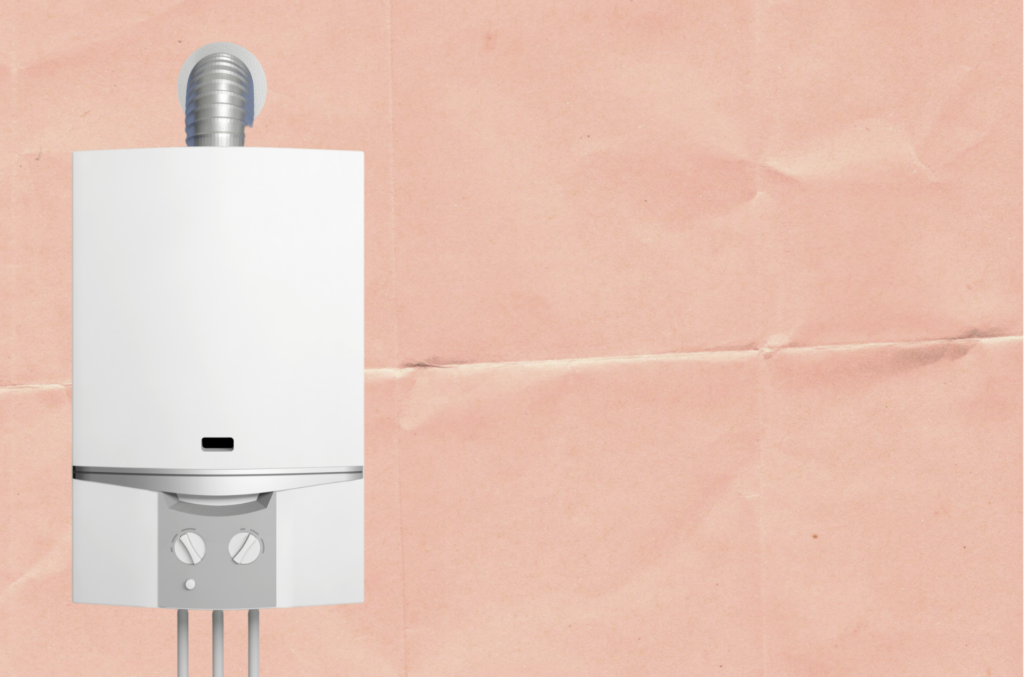What’s that insistent rumbling sound that doesn’t seem to shift? It’s certainly not storm clouds on the horizon, since the sun is shining brightly. Neither is it your tummy; you’ve just had lunch after all. Nope, that ominous, omnipresent growl is your boiler, and I hope you don’t mind us saying that it doesn’t sound too healthy. A boiler service might well in order…
Don’t let your boiler be the culprit of wasted energy, pollution, and high bills. Indeed, neglecting this vital domestic appliance can lead to serious consequences for both your wallet and the environment.

Did you know that running an old gas boiler can cost you up to £455 a year extra in energy bills and contribute significantly to your carbon footprint? If you can’t afford to replace your boiler (at an average cost of £4000), don’t worry; regular boiler maintenance is the solution you’ve been looking for.
Not only will it benefit the environment by reducing energy consumption, and greenhouse gas emissions, but it can also prolong the life of your boiler and save you money on your heating bills. Here we explore further why regular boiler maintenance is essential for reducing your home’s carbon footprint.
Key Takeaways | Boiler Maintenance For The Environment
- Poorly maintained boilers lead to wasted energy, pollution, high bills, significant greenhouse gas emissions, and air pollution.
- Regular maintenance, such as yearly servicing and cleaning, can prevent negative environmental impacts, extend the appliance’s lifespan, and save you money.
- Additional measures, including upgrading to high-efficiency boilers and insulating homes, further reduce emissions.
How Do Boilers Affect The Environment?
Boilers have an undeniable impact on the environment and it’s important to be aware of how you can prevent the negative environmental impacts.
Fossil Fuels
The most significant impact on the environment is primarily through their consumption of fossil fuels and emissions of greenhouse gases and other pollutants. According to the International Energy Agency, heating and cooling account for approximately 40% of global energy consumption and 32% of energy-related carbon dioxide emissions.
Boilers burn natural gas, oil, or coal to produce heat, which releases carbon dioxide and other greenhouse gases into the atmosphere with a poorly maintained boiler wasting a significant amount of household energy. This can have numerous environmental impacts, such as rising sea levels, more frequent extreme weather events, and loss of biodiversity.
Air Pollution
Air pollution is what is caused by boilers that are not properly maintained as they emit harmful pollutants into the air, such as carbon monoxide, particulate matter, nitrogen oxides, and sulphur dioxide. These pollutants can harm human health and the environment. For example, particulate matter can cause respiratory problems, while nitrogen oxides can contribute to the formation of smog and acid rain.

What Is The Importance Of Boiler Maintenance For The Environment?
According to Rowlen, who offer commercial boiler service Kent, here are four ways that boiler maintenance can support the environment and prevent the negative impacts:
- Energy efficiency – Regular servicing can help boilers operate more efficiently, using less fuel to produce the same amount of heat to lessen energy waste.
- Decrease greenhouse gas emissions – Boilers that are not looked after can produce more carbon dioxide and other greenhouse gases than necessary, contributing to climate change. Ensuring that boilers are operating at peak efficiency will help lower these emissions.
- Reduce harmful pollutants – Poorly maintained boilers can emit harmful pollutants such as nitrogen oxides and sulphur dioxide, which can harm human health and the environment but maintenance can help prevent these emissions and protect air and water quality.
- Waste reduction – Boilers that are not properly maintained may need to be replaced more frequently, leading to additional waste and resource consumption. Prolong its lifespan with regular maintenance to ensure your home is as eco-friendly as possible.
What Kind Of Maintenance Does A Boiler Need?
To maintain a well-functioning and safe boiler, it is important to have a yearly boiler service. During this service, a heating engineer will carry out a thorough inspection of the boiler components, including the heat exchanger, burner, ignition system, and flue, to identify any signs of damage.
Other tasks carried out will include:
- Boiler cleaning to clean the boiler components including the burner, heat exchanger, and flue to remove dirt, debris, and rust.
- Gas pressure will be checked and adjusted.
- Safety controls, such as the thermostat, pressure relief valve, and carbon monoxide detector, will be checked to ensure they are functioning correctly.
- The boiler’s efficiency will be measured with necessary adjustments made.
- The pump and fan will be lubricated.
- Water treatment will be used to reduce mineral build-up.
- A Gas Safe certificate will be issued upon completion.
How Do I Reduce My Boiler Emissions?
Asides from regular boiler services, there are some other ways that you can reduce your energy emissions that will be of huge benefit to the environment. These include:
- Upgrade to a high-efficiency boiler – Older boilers are generally less efficient and produce more emissions than newer models. Upgrading to a newer, more efficient model will reduce your carbon footprint.
- Install a programmable thermostat – A programmable thermostat can help you control your home’s temperature more effectively, reducing energy waste and emissions.
- Insulate your home – Insulating your home can help retain heat and reduce the amount of energy required to heat your home, which can result in lower emissions.
- Use renewable energy – Consider installing a renewable energy source, such as solar panels or a wind turbine, to power your home and reduce your reliance on fossil fuels.
- Reduce water consumption – Boilers that use water tend to have higher emissions because of the additional energy needed to heat the water. Reducing your water usage will lower emissions and save energy.
- Upgrade your windows – Windows with a draught will let cold air in meaning your boiler needs to work harder to heat your home, causing higher emissions. Upgrade to energy-efficient windows to reduce heat loss. Be sure to check for sources of air leaks, such as doors, too!
- Use a timer for hot water – If your boiler also provides hot water, use a timer to control when it is heated to reduce energy waste.
Frequently Asked Questions
Does a water boiler require additional maintenance?
Water boilers do tend to need more maintenance compared to other types as they use water to generate heat. This will cause minerals in the water to build up in the pipes and heat exchanger, reducing efficiency. Regular water treatments will help to remove the minerals and prevent corrosion.
Is there any home boiler maintenance that homeowners can undertake in between services?
Boiler maintenance tasks that homeowners can undertake in between services include checking the pressure and bleeding radiators to ensure they are functioning correctly. These are simple tasks, but we would always recommend contacting a qualified heating engineer if you are unsure or for more complex tasks.
The Bottom Line
Regular boiler maintenance may feel like one of those chores we can ignore but it is essential for both the environment and the efficient operation of your appliance.
Neglecting your boiler can lead to wasted energy, increased bills, and harmful emissions. Minimise your boiler’s impact on the environment, prolong its lifespan, and save money on your heating bills with a yearly service as well as regularly checking the pressure and bleeding the radiators.





